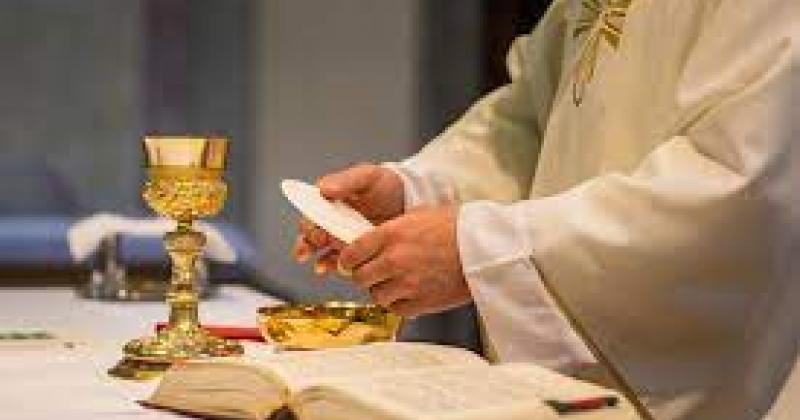The observance of Corpus Christi (formally “The Solemnity of the Most Holy Body and Blood of Christ”) celebrates the gift of the Eucharist to the church. The thanksgiving we offer is for Christ himself and his real presence in the consecrated bread and wine, the Body and Blood of Christ.
The belief in the real presence is rooted in Jesus’ own words at the Last Supper. These words are handed down to us through accounts in the Gospels according to Matthew, Mark and Luke as well as in St. Paul’s First Letter to the Corinthians.
This last passage serves as the second reading in Sunday’s liturgy. After taking the bread and giving thanks, He breaks it and says: “This is my body that is for you. Do this in remembrance of me.” Similarly, he takes the cup and says: “This cup is the new covenant in my blood. Do this, as often as you drink it, in remembrance of me.” Jesus refers to his body being given “for you.”
His body and blood are offered as the perfect sacrifice of reconciliation on the cross. His body is broken as the bread is broken. His offering is for us. The reconciliation he accomplishes is one that brings with it healing and life – eternal life.
In the Gospel According to John, Jesus speaks of himself as the “Bread of Life” (cf. John 6:35, 48, 51). The association with the Eucharist comes as he says: “Amen, amen, I say to you, unless you eat the flesh of the Son of Man and drink his blood, you do not have life within you. Whoever eats my flesh and drinks my blood has eternal life, and I will raise him on the last day. For my flesh is true food, and my blood is true drink. Whoever eats my flesh and drinks my blood remains in me and I in him. Just as the living Father sent me and I have life because of the Father, so also the one who feeds on me will have life because of me” (John 6:53-57).
The true food and true drink is Jesus really present in the Eucharist.
The Gospel account for this Sunday’s liturgy comes from the Gospel According to Luke. The passage recalls the feeding of the multitude (in this account 5,000 men – not mentioning women and children). Each of the four gospels has this account offering different nuances in presentation. The account provides a eucharistic theme in that Jesus provides for the people of himself and he calls his disciples to do the same; it is an act of love. Jesus sees the need of the people. His seeks to satisfy their needs even before they themselves realize the need.
The interaction with the Twelve provides an instruction for the church to imitate Christ in caring for the multitudes. “Give them some food yourselves,” he says. They object saying they do not have any but “five loaves and two fishes.” The miracle that occurs points to God’s providential care – he is the one who provides.
This is good to remember when we see so much poverty and need in our world. We do our best to provide but we must keep in focus the One who is the source of all nourishment, the One who can accomplish the seemingly impossible. The overwhelming gift of the food is seen in the comment offered by the evangelist: “They all ate and were satisfied.” The twelve wicker baskets of food that remained points forward, once again, to the role of the church in carrying on Jesus’ mission.
The first reading recalls the King of Salem, who is also “priest of God most high,” bringing bread and wine” as thanksgiving to God and Abraham. Melchizedek is a mysterious figure in the Scriptures. This is the only account of him anywhere in the bible. He becomes a pre-figuring image of Christ, the High Priest and is associated as such in the Letter to the Hebrews. Melchizedek is the king of “Salem” which means peace. His name means “king of righteousness.” He offers the bread and wine. These are some of the associations with Jesus the great high priest who not only offers the sacrifice but is himself the sacrifice.
The liturgy of Corpus Christi reminds us that Jesus is really present in the Eucharist we celebrate. He not only teaches us with his word but feeds us with his Body and Blood. This nourishment is to strengthen us for the life of love. He feeds us with himself so that we too may share in his offering and be his instruments of charity and peace in the world today.
